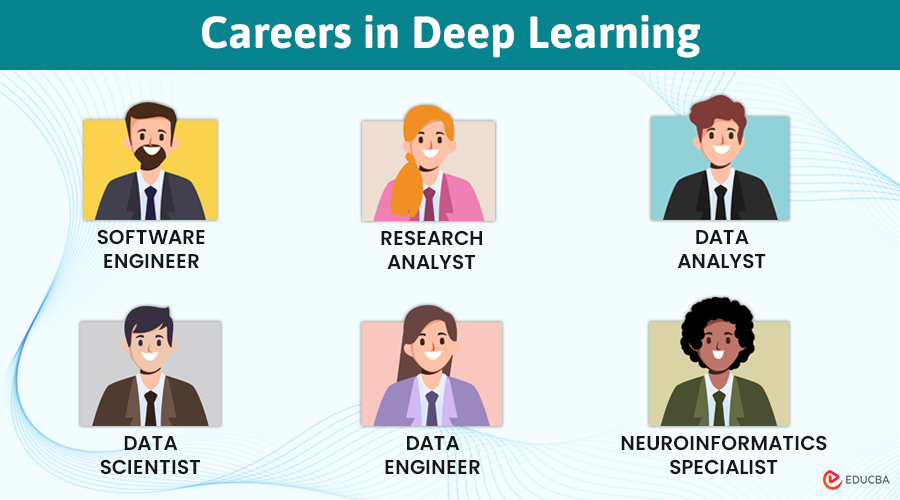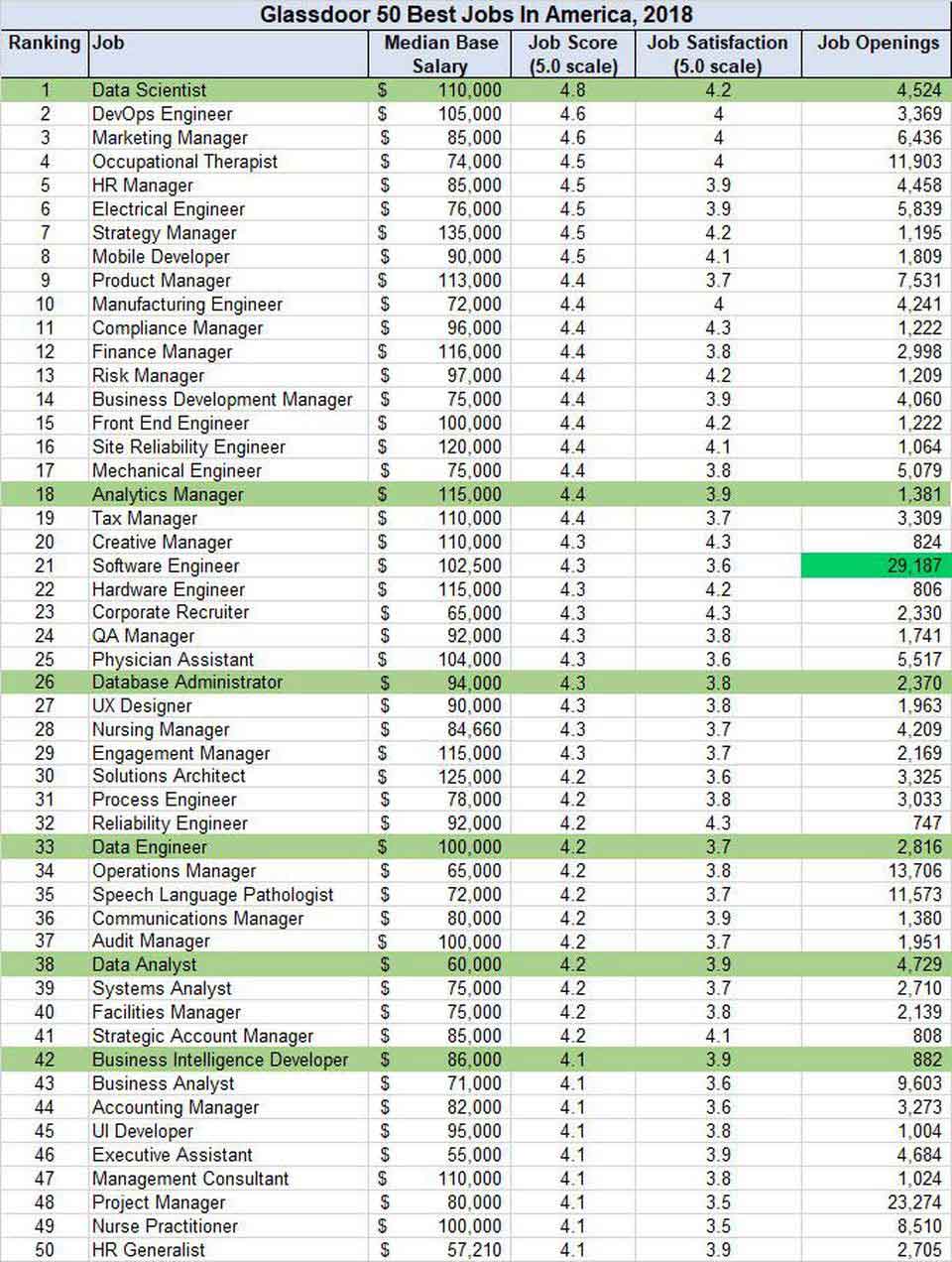Introduction to Careers in Deep Learning
Deep learning, known as neural organized learning or different leveled learning, is part of a more extensive group with a wide range of jobs (like software engineer, research analyst, Data Analyst, Data Engineer, Bioinformation, Software developer, etc.) as one of the most well-known neural network dialects used today. As a result, deep learning engineers have numerous options for neural programming skills like building a Convolutional neural network, RNN, LSTM, Batch Normalization, etc.
Careers in Deep Learning offer organizations another arrangement of systems to take care of complex explanatory issues and drive rapid developments in counterfeit consciousness. By encouraging a deep learning calculation with vast volumes of information, models can be prepared to perform complex undertakings like discourse and picture examination. Deep learning’s models are approximately identified with data preparation and correspondence designs in an organic sensory system, for example, neural coding that endeavors to characterize a connection between different data and related neuronal reactions in the brain.
Deep learning’s structures, for example, deep neural systems, deep conviction systems, and intermittent neural systems, have been connected to fields including PC vision, discourse acknowledgment, regular dialect handling, proper acknowledgment, informal community sifting, machine interpretation, bioinformatics and medicate design, where they have created about practically identical to and at times superior to human experts. Careers in Deep Learning is another region of Machine Learning research, which has been presented to draw Machine Learning nearer to one of its unique objectives: Artificial Intelligence. This site is expected to have an assortment of assets and pointers to data about Careers in Deep Learning.
Education to Deep Learning Skills
Excellent Learning-Educational skills for students wanting to make a Deep Learning career.
Deep Learning Neural Network
- Convolutional networks
- RNNs
- LSTM
- Adam
- Dropout
- Batch Norm
- Xavier/He initialization
Probabilistic methods
- Continuous and discrete distributions
- Maximum likelihood
- Cost functions
- Hypotheses and tasks training data
- Maximum likelihood-based cost
- Cross-entropy
- MSE cost feed-forward networks
- MLP, sigmoid units
- neuroscience inspiration
- Gradient descent
- Recursive chain rule
- Bias-variance tradeoff
- Regularization
Practical
- linear regression
- softmax
- tanh
- RELU
- Tensorflow
Career Path in Deep Learning
Deep learning is a standout amongst the most well-known neural network dialects utilized today due to its straightforward image structure and because it is a universally helpful neural programming dialect. You see Careers in Deep learning used as a part of numerous territories.
New Deep learning engineers have numerous options regarding neural programming. Careers in Deep learning alone aren’t sufficient for most of these profession choices; they all require supporting abilities. For instance, if you needed to get into probabilistic advancement with Statistics other than learning a neural network system. Skills like Convolutional networks, RNNs, LSTM, Adam, Dropout, Batch Norm, Xavier/He initialization.
A student interested in this profession has practical knowledge of these skills linear regression, softmax, tanh, RELU, and Tensorflow.
The previously mentioned Deep Learning specializations (AI, Neural advancement, Data sciences, and so forth) require distinctive aptitudes. Software Engineer clients get information assets to perform work obligations in particular application spaces. Data-based analysts both in the scholarly world and in the industry give the extraordinary case of a neural analysis Engineer client. However, this gathering is widening in scope. For instance, therapeutic experts (e.g., doctors and hereditary instructors) use Data Engineer assets in medicinal settings for the motivations behind analysis, treatment, and advising of patients.
Data Engineer
Researchers are scholars who utilize computational and Artificial techniques keeping in mind the end goal to propel the logical comprehension of living frameworks. Data Engineer makes the novel computational strategies required by Data Engineer clients and researchers. In this way, a Data Engineer designs must-have qualities in computational and Natural sciences and must have a general competency in biomedical sciences. Singular patrons of many logical labs in the academic and business divisions are contracting individuals prepared in Deep Learning to help examine the lab. Positions are accessible for different levels and kinds of preparation. Individuals in these positions, for the most part, chip away at a particular territory of research. Center offices in many organizations make a focal asset for labs in a foundation. These assets are call center offices. Individuals from such gatherings frequently have a blend of aptitudes and work on various research ventures with scientists in multiple labs.
Instructors
There is an interest in showing Data Engineer at various levels—some Ph.D.-level Data Engineers will seek an academic profession, construct their research plan and instruct at the college level. Moreover, multiple foundations have a devoted office to instruct Data engineers to individuals inside the organization. Data Science – designers – Another professional way that backings Data engineers is the improvement of new calculations and neural network analysis.
Job Positions
- Software Engineer
- Research Analyst
- Data Analyst
- Data Scientist
- Data Engineer
- Neuroinformatics
- Bioinformatician
- Image Recognition
- Software Developer
- Research Scientist
- Research Fellow
- Instructor for Deep Learning
- Applied Scientist
- Full Stack Web Developer for Deep Learning
- Lead Manager – Deep Learning
- Natural Language Process Engineer
Career Opportunity for Deep Learning
Multiple Job Opportunities for Deep learning professionals. More detail can be found here https://www.linkedin.com/jobs/
Salary
What is the average salary for jobs related to “deep learning”?
The average “deep learning” salary ranges from approximately $77,562 per year for Research Scientist to $135,255 per year for Machine Learning Engineer.
https://www.indeed.com/salaries/Deep-Learning-Salaries
Six analytics and data science jobs are included in Glassdoor’s 50 best jobs In America for 2018. These include Data Scientists, Analytics Managers, Database Administrator, Data Engineer, Data Analyst and Business Intelligence Developers.
Career Outlook
In the least complex terms, an information researcher chases through gigantic measures of unstructured and organized information to give bits of knowledge and help meet particular business needs and objectives.
Recommended Articles
We hope that this EDUCBA information on “Careers in Deep Learnings” was beneficial to you. You can view EDUCBA’s recommended articles for more information.


